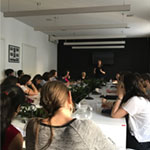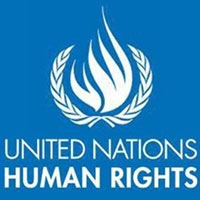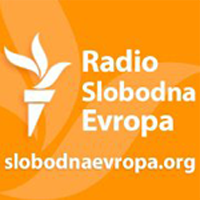


Sorry, this entry is only available in srpski.

 Students attending the Master’s Programme at the Geneva Academy of International Humanitarian Law and Human Rights, visited the Humanitarian Law Center (HLC) on March 31st,2017, as part of their study visit to Serbia.
Students attending the Master’s Programme at the Geneva Academy of International Humanitarian Law and Human Rights, visited the Humanitarian Law Center (HLC) on March 31st,2017, as part of their study visit to Serbia.
The HLC Legal Programme Director, Ms. Milica Kostić, presented the HLC’s work on documenting human rights violations committed during the wars in the former Yugoslavia and its engagement in the field of criminal justice and reparation for war victims.
Ms. Anita Mitić, the Director of the Youth Initiative for Human Rights (YIHR), also talked with the students, presenting the work of the YIHR and transmitting her own experiences in working on dealing with the legacy of the past.
The students took an active part in the discussion, and expressed interest primarily in the relation of the society in Serbia towards the legacy of the past, the attitude of state institutions towards victims of human rights violations, and the presentation of the events from the 1990s in official educational programmes.

 Two weeks after the end of hostilities in Kosovo, three young Albanian-Americans who had joined the Kosovo Liberation Army (KLA) were arrested by Yugoslav police, tortured and killed. Eighteen years later, the conflict has been largely forgotten, but the men’s youngest brother continues a lonely fight for justice.
Two weeks after the end of hostilities in Kosovo, three young Albanian-Americans who had joined the Kosovo Liberation Army (KLA) were arrested by Yugoslav police, tortured and killed. Eighteen years later, the conflict has been largely forgotten, but the men’s youngest brother continues a lonely fight for justice.
Towards the end of June 1999, Ylli, Agron and Mehmet Bytyqi (pronounced Bootoochee) were escorting a Roma family out of Kosovo to the Serbian border. It was a act of kindness. The Bytyqi brothers – whose parents knew the family well – were guaranteeing their safety up to Kosovo’s border with Serbia, since many ethnic Albanians viewed Roma with suspicion.
Sorry, this entry is only available in srpski.

 At the meeting held on March 23rd 2017, the UN Human Rights Committee adopted the Concluding Observations on the Third Periodic Report on Serbia. The Concluding Observations contain the Committee’s overview of the situation in Serbia regarding human rights, as regards the Third Periodic Report that Serbia submitted in September 2015. As being the most problematic areas, the Committee has identified the rights and position of the Roma people, the LGBTI community, people with disabilities, women, children, refugees and asylum seekers, victims of trafficking and forced labour, as well as victims of the war-related crimes committed during the armed conflicts in the former Yugoslavia.
At the meeting held on March 23rd 2017, the UN Human Rights Committee adopted the Concluding Observations on the Third Periodic Report on Serbia. The Concluding Observations contain the Committee’s overview of the situation in Serbia regarding human rights, as regards the Third Periodic Report that Serbia submitted in September 2015. As being the most problematic areas, the Committee has identified the rights and position of the Roma people, the LGBTI community, people with disabilities, women, children, refugees and asylum seekers, victims of trafficking and forced labour, as well as victims of the war-related crimes committed during the armed conflicts in the former Yugoslavia.

Sorry, this entry is only available in srpski.

Sorry, this entry is only available in srpski.